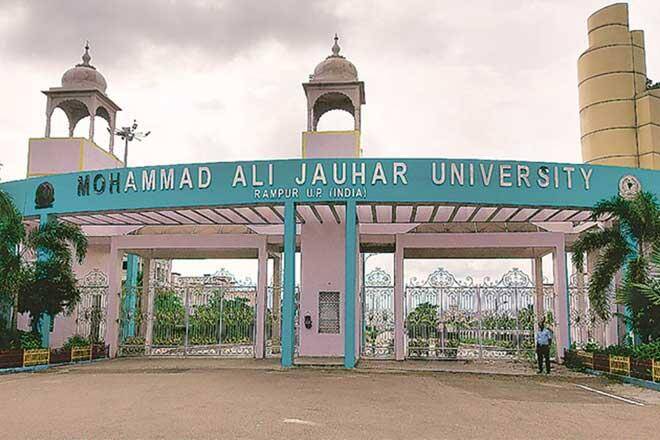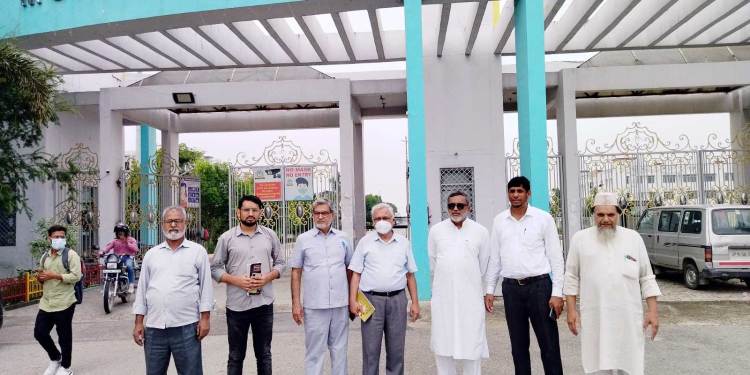
Mohammad Ali Jauhar University on the outskirts of Rampur town seems to have become a victim of political vendetta, with the state government having acquired 173 acres of the university land, out of a total of 350 acres, and registered it as government land in state revenue records. However, the matter is pending in the Allahabad High Court.
The state government’s actions against the university, mainly when it is admission time, discourage the students from seeking admission. Against 2500 students till 2018, the student strength has now come down to 1100. The university runs engineering, management, pharmacy, law, B.Ed, paramedical, humanities, Islamic studies, and many other courses. The varsity has state-of-the-art buildings comparable with any of the best universities in the country.
The university got approval from the University Grants Commission and was passed as a private university by the UP State Assembly in 2012 when Samajwadi Party’s Akhilesh Yadav was Chief Minister. However, it came under controversy ever since the BJP came to power in March 2017, with Yogi Adityanath as Chief Minister. The National Commission for Minority Educational Institutions (NCMEI) granted it the status of a minority institution in May 2013.
SP leader Azam Khan happens to be the lifelong chancellor of the university set up by the Mohammad Ali Jauhar University Trust.
It is a coincidence that both the university and Azam Khan are facing problems ever since the BJP took over the political power in the state.
Azam Khan, against whom 81 criminal cases were registered after BJP came to power, is currently fighting for life in Lucknow’s Medanta Hospital for kidney ailments.
The charges against him range from cheating, the alleged fake birth certificate of his son Abdullah Azam to enable the latter to contest assembly elections in 2017, criminal trespass, and land-grabbing. There are 44 cases booked against Abdullah Azam.
In the fake birth certificate case and other cases, Azam Khan, his son, and wife – Tazeen Fatima – were arrested on February 26, 2020, and kept in Sitapur Jail.
However, the 73-year-old Azam Khan contracted Covid-19 infection in April 2021 and was kept on a life-support system for corona treatment in a Lucknow hospital. After recovery, he was sent back to jail but re-admitted to the hospital after complaining of kidney problems.
However, after ten months of jail, seventy-one-year-old Tazeen Fatima was released on bail on December 23, 2020. She was booked in as many as 34 cases. A former professor in a government college, Tazeen was elected as MLA from Rampur Sadar in October 2019. At the same time, Azam Khan is an MP from Rampur, their son Abdullah Azam was elected MLA from the Suar assembly seat in 2017 but was later disqualified due to the alleged forging of his birth certificate.


Several cases booked against the university after Azam Khan’s arrest
Several cases were instituted against Mohammad Ali Jauhar University after the imprisonment of Azam Khan. Public Works Department (PWD) has claimed that the university’s main gate was built on PWD land and moved the court for its removal and claimed damages. PWD also alleged that they had constructed a four-lane road and 1.5 km link road that currently falls inside the university. PWD alleged that since a government department built the road inside the university, the road has become a public road. However, the university has blocked the movement of the general public by erecting a gate at the university’s main entrance from where the “PWD-built” road begins.
A lower court had a few months ago imposed a fine of Rs. 3.27 crore on the university as damages for closing the road from June 2016 to May 2019. The court also ordered an additional penalty of Rs. 9.10 lakh a month till the removal of the gate.
The Rampur district and sessions judge on August 2 upheld the order of the lower court but modified the damages’ cost and directed the university to pay Rs. 1.63 crore from June 2016 to May 2019 and asked to pay Rs. 4.55 lakh per month till the removal of the gate. The university has challenged the order in the high court.
University authorities dispute PWD claim
However, the university authorities dispute the claim of PWD officials. They say that the main gate was constructed in 2006, while the road was built by PWD later on. According to authorities, the land on which the university’s main gate stands is university land, and the registry of the land is in the name of the Mohammad Ali Jauhar Trust. As for the road inside the university, the authorities say that PWD built it to enable SP supremo Mulayam Singh Yadav to reach the venue to inaugurate the university. The authorities say that the land on which PWD built the road belongs to the university, not the PWD, and hence, PWD cannot claim the road to be PWD or public road.
As for blocking the free movement of the public from the main gate and via “PWD road,” the authorities say they are ready to keep the gate open for the public provided that there are people available to use the road. The university is located on the bank of the Kosi river. While the university’s main gate is on the eastern side of the university, the river Kosi forms the western boundary of the university. There is no vacant land, villages, or human habitation between the university’s western boundary and the Kosi river. The question asked by the university authorities is whose movement the university obstructs when there is no human habitation on the other or the western side.
Moreover, according to university officials, the “PWD Road” and the main gate are on the university land, and keeping the gate and the road open for 24 hours will threaten the university’s security. The university authorities say that there is a four-lane government road along the northern boundary of the university, which can be used by anyone interested in going to the river Kosi. Why threaten university security?
Why did PWD build the road on university land?
One more question arises. Why did the PWD build the road on land which was not in their possession? Who authorized the local PWD officials to do it? Why is no inquiry being held against those officials? Shivpal Singh Yadav was the PWD minister when the road inside the university was built. Why is he not being questioned? And why did PWD authorities keep mum when the university’s main gate was built? Being a trustee of PWD properties, the local PWD head should have immediately objected. PWD authorities, who have now moved the court, should also initiate action against the former PWD official during whose tenure the university’s main gate was built. Why is he being allowed to go scot-free if the land belongs to PWD?
Villagers support university
The university has also been accused of grabbing 3.75 bigha land belonging to 40 owners. The university says they had paid the owners but could not get the land transferred in the name of the trust. When the land-grabbing issue was raised, the owners initially said they had not received payments. The university offered to pay them again, provided they agreed to transfer the land to the university. But as many as 27 people of the Shaukat Nagar village, adjoining the university, filed the FIR. “But, after they came to know of the conspiracy to demolish the university and close it down, the villagers have submitted applications to withdraw the complaints,” alleged one of the university officials. And it was the Shaukat Nagar villagers who challenged the government officials who wanted to demolish the main gate of the university after the district court’s orders on August 2.
One of the villagers told this reporter that the villagers were not against the university. “It is our asset, and we will not allow anyone to harm the university,” said the villager. However, they said that the administration was very harsh against anyone or any villager who supported the university. The residents of Aliya village on the northern boundary of the university say they were also with the university. “We don’t want any harm to the university,” said several youths of the village whom this writer talked to during a visit to the university.
Regarding about 100 acres of the land called evacuee or enemy property belonging to those who migrated to Pakistan, the authorities say that the land was initially transferred to the local wakf board. And when the university was planned, the evacuee property under the wakf board was transferred to the university trust through due process. “But if the government wants, the trust is ready to pay to the wakf board for it,” said one of the university officials on conditions of anonymity. The official said that there was no logic in taking steps that would result in the closure of the institution that is a national asset.
Jamaat-e-Islami Hind delegation visits university, meets collector, demands solution in favour of university
A delegation of the Jamaat-e-Islami Hind (JIH) visited the university on Tuesday under the leadership of Malik Moatasim Khan, JIH’s community affairs secretary, to know the ground situation at the university.


After meeting the university authorities, the delegation called on district collector Ravindra Kumar Mander and briefed him about the actual situation. “The Muslim community is very backward in education, and the university that has come up in Rampur is for the benefit of all the communities. But administration’s actions, particularly at the time of admissions, create awe and fear among the students that has resulted in a decline in the strength of the students in the university. This is a matter of concern for the community. The Muslim community, particularly its women, is very backward in education. They can benefit from the university, which is just on the city’s outskirts, if it runs properly. A university does not belong to any community. It is a different thing who runs it. It is a national asset. Every community can benefit from it,” the delegation told the collector, requesting him to ensure that no harm is done to the buildings of the university that have been built with investments of hundreds of crores of rupees. The delegation told the collector that the main issue pertained to the land, which the government could solve in the interest of education. The government should show its large-heartedness. Even if some government land has been included in the university, the government should either allot it to the university or claim its compensation. But demolishing the buildings or taking steps that lead to the closure of the university is not justified.
The collector, who listened to the delegation with rapt attention, assured that the administration would not go ahead with demolishing the buildings. As for court cases, he said these have to be decided by the courts only, and the rest by the authorities at higher levels in the government.
Syed Khalique Ahmed is the editor of India Tomorrow. You can read the original article here.



